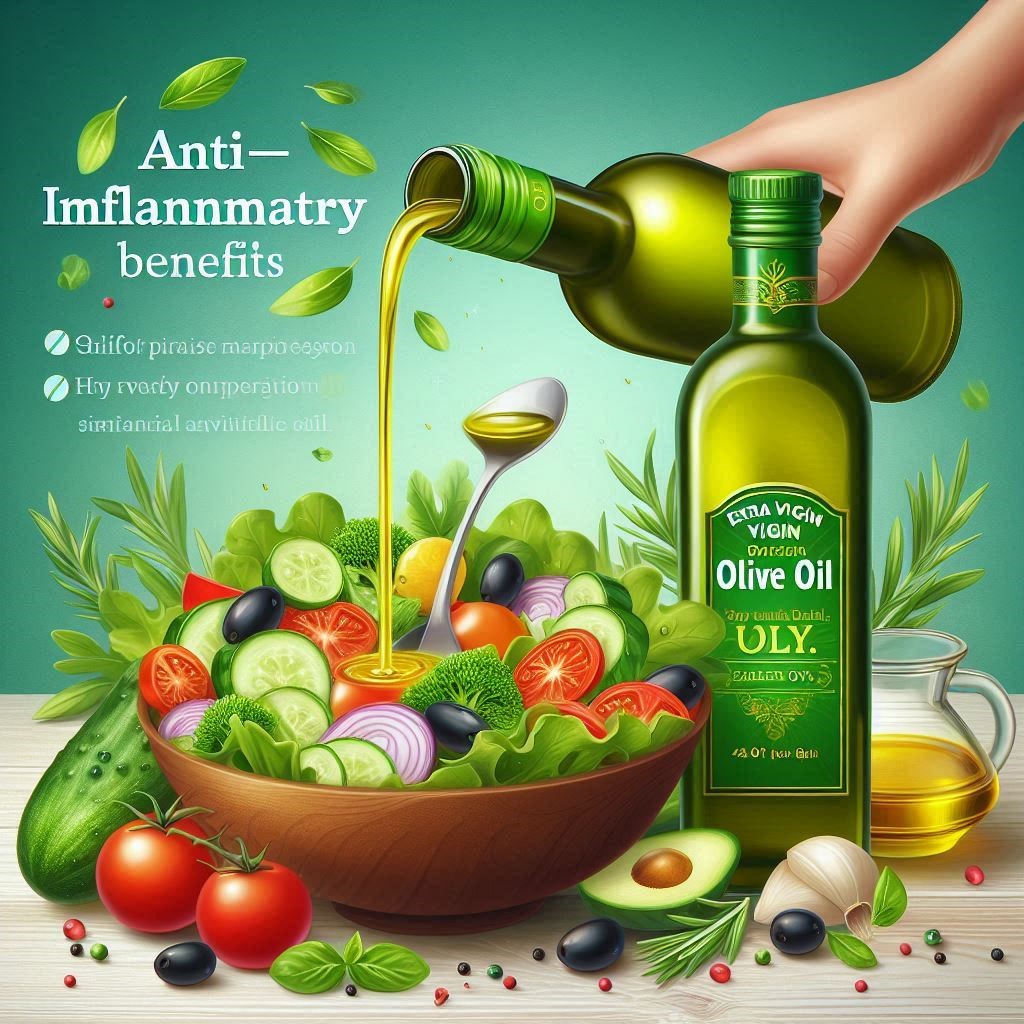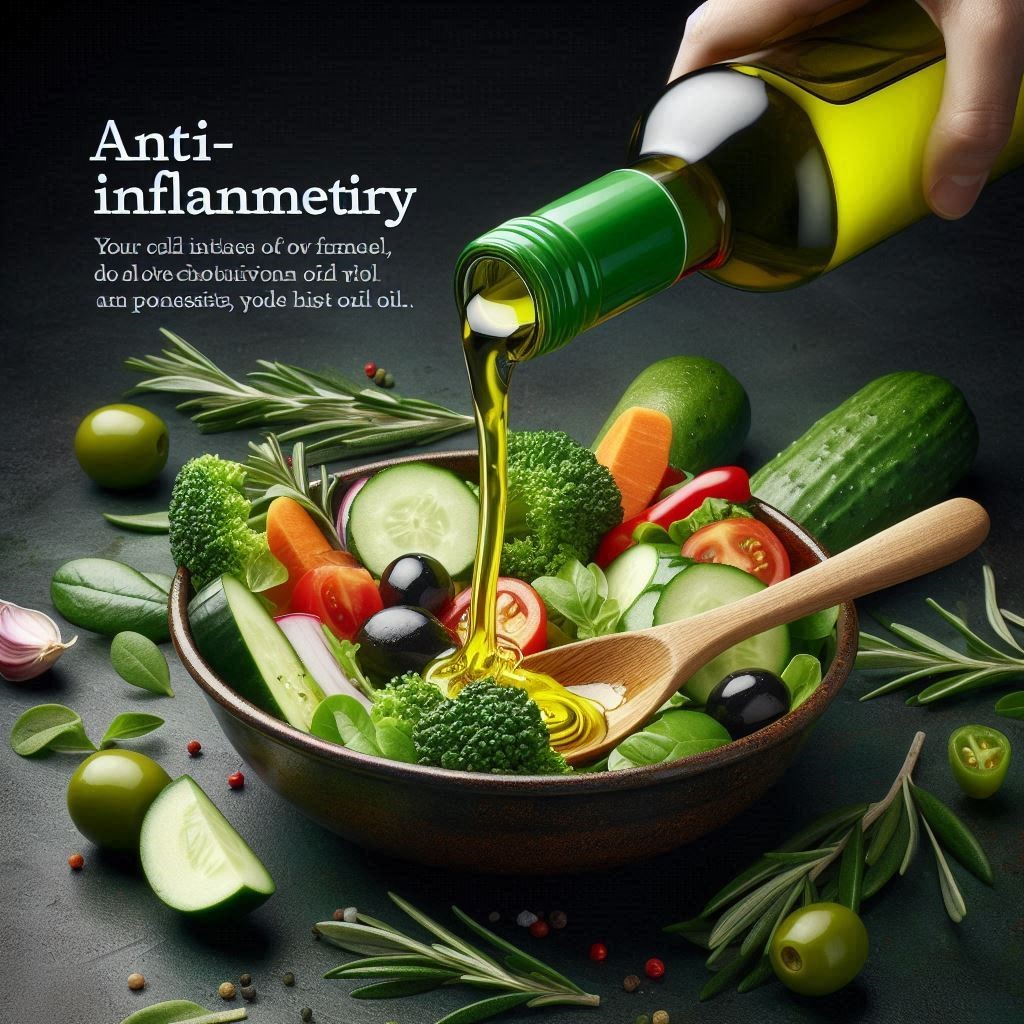
Olive Oil: A Comprehensive Scientific Review
Mediterranean cuisine celebrates olive oil, not just for its rich flavor but also for its remarkable health benefits. This article delves into the diverse aspects of olive oil, covering its types, nutritional content, health impacts, and practical uses, while highlighting research gaps and emerging trends in its study.
Types of Olive Oil
Understanding the different types of olive oil is crucial for selecting the best one for your needs:
- Extra Virgin Olive Oil (EVOO): The highest quality, produced through cold pressing without chemical treatments. It retains the most flavor and nutrients, making it ideal for dressings and dipping.
- Virgin Olive Oil: Similar to EVOO but with slightly higher acidity and less robust flavor, suitable for cooking.
- Refined Olive Oil: Undergoes chemical refining, resulting in a milder flavor and higher smoke point, useful for high-heat cooking.
- Olive Pomace Oil: After the initial press removes the most valuable oil, the remaining olive pulp undergoes further processing to produce pomace olive oil. Cooks often blend pomace olive oil with virgin olive oil for frying and other cooking applications.
Gaps in Research: Long-term studies haven’t provided a detailed comparison of the specific health impacts of different olive oil types.
Nutritional Composition of Olive Oil
Oleic acid, a monounsaturated fat, reigns supreme in olive oil, making up around 73% of its composition. It also contains small amounts of polyunsaturated fats and saturated fats.
Key Nutrients:
- Vitamin E: An antioxidant that protects cells from damage.
- Polyphenols: Compounds with anti-inflammatory and antioxidant properties.
- Oleuropein and Hydroxytyrosol: Phenolic compounds that contribute to the oil’s health benefits.
Nutritional Facts per Tablespoon:
- Calories: 126
- Total Fat: 14g
- Saturated Fat: 2.2g
- Monounsaturated Fat: 9.8g
- Polyunsaturated Fat: 1.3g
- Vitamin E: 2.9mg (20% of the Daily Value)
Gaps in Research: While there is extensive research on the benefits of monounsaturated fats, further studies are needed to explore the role of minor components like squalene and chlorophyll in health.

Health Benefits of Olive Oil
Cardiovascular Health
Olive oil is strongly associated with improved heart health. Studies show that its high monounsaturated fat content helps lower LDL cholesterol and raise HDL cholesterol, reducing the risk of heart disease and stroke.
Anti-inflammatory Properties
Oleic acid and polyphenols in olive oil have been shown to reduce inflammation, a precursor to many chronic diseases. Regular consumption can decrease markers of inflammation, such as C-reactive protein (CRP).
Cancer Prevention
Some research suggests that olive oil’s antioxidants may protect against certain cancers by reducing oxidative damage to cells. This is particularly noted in Mediterranean populations with high olive oil consumption.
Diabetes Management
Olive oil may help regulate blood sugar levels and improve insulin sensitivity, making it beneficial for people with type 2 diabetes.
Brain Health
Consuming olive oil is linked to better cognitive function and a lower risk of neurodegenerative diseases like Alzheimer’s, attributed to its anti-inflammatory and antioxidant properties.
Gaps in Research: More longitudinal studies are needed to solidify the connections between olive oil consumption and its protective effects against specific diseases.
Practical Uses of Olive Oil
Cooking
Contrary to popular belief, high-quality extra virgin olive oil is safe for cooking at moderate temperatures. Its smoke point ranges between 374 and 405 degrees Fahrenheit, making it suitable for most culinary applications.
Skin Care
Olive oil’s moisturizing properties make it a popular ingredient in skincare. It contains squalene and vitamin E, which help retain skin moisture and reduce signs of aging.
Daily Consumption
Incorporating olive oil into your diet can be simple:
- Use it as a dressing for salads.
- Drizzle over cooked vegetables or pasta.
- Substitute it for butter in baking.
Gaps in Research: The effects of different olive oil applications, such as topical versus dietary, require more comparative studies to fully understand their distinct benefits.

Emerging Trends and Future Directions
Sustainable Production
With increasing demand, sustainable olive farming practices are gaining attention. Research into less water-intensive cultivation and organic farming methods is crucial for future olive oil production.
Genetic Diversity
Studies are exploring the genetic diversity of olive trees to breed varieties that are more resistant to pests and climate change, potentially improving yield and oil quality.
Gaps in Research: There is a need for more studies on the environmental impact of large-scale olive oil production and the benefits of biodiversity in olive orchards.
The Anti-Inflammatory Benefits of Olive Oil
Extra virgin olive oil (EVOO), especially prized for its health benefits, is extracted from the fruit of the olive tree. Renowned for improving heart health and reducing inflammation, EVOO is a staple in the Mediterranean diet. Its rich content of monounsaturated fats and polyphenols, powerful antioxidants, contributes to its health benefits.
The Composition of Olive Oil
Olive oil is rich in several beneficial compounds:
- Monounsaturated fats: These fats, especially oleic acid, are known to reduce inflammation and improve heart health.
- Polyphenols: These include oleocanthal, hydroxytyrosol, and oleuropein, which have antioxidant, anti-inflammatory, and anti-cancer properties.
- Vitamin E: An antioxidant that helps protect cells from damage.
Mechanisms of Anti-Inflammatory Action
The anti-inflammatory benefits of olive oil are largely attributed to its high polyphenol content:
- Oleocanthal: This polyphenol actively inhibits the activity of inflammatory enzymes COX-1 and COX-2, mimicking the way nonsteroidal anti-inflammatory drugs (NSAIDs) like ibuprofen work.
- Studies suggest that consuming about 3.5 tablespoons of EVOO provides anti-inflammatory effects comparable to a 200-mg dose of ibuprofen.
- Hydroxytyrosol: This compound reduces markers of inflammation such as C-reactive protein (CRP) and interleukin-1 beta, helping to mitigate chronic inflammation associated with various diseases.
- Oleuropein: Known to protect against oxidative stress and inflammation, oleuropein is also a precursor to hydroxytyrosol and contributes to the overall anti-inflammatory properties of olive oil.
Benefits for Specific Conditions
- Cardiovascular Health: Studies suggest that regularly consuming EVOO reduces inflammation and oxidative stress in the arteries, potentially preventing atherosclerosis and other cardiovascular diseases. It also lowers the risk of stroke and heart attacks by reducing inflammatory markers and improving lipid profiles.
- Arthritis: The anti-inflammatory compounds in olive oil, especially oleocanthal, help reduce inflammation and pain associated with rheumatoid arthritis and osteoarthritis. They work by attenuating inflammatory mediators and slowing the degenerative process in joint diseases.
- Cancer: Olive oil’s polyphenols have shown potential in reducing the risk of various cancers, including breast, prostate, and colon cancer. These compounds inhibit cancer cell proliferation and promote apoptosis (programmed cell death) in cancer cells.
- Neurodegenerative Diseases: Oleocanthal offers a promising defense against Alzheimer’s disease by preventing the formation of beta-amyloid plaques in the brain. Additionally, olive oil’s antioxidants help protect against other neurodegenerative disorders like Parkinson’s disease.
Incorporating Olive Oil into Your Diet
To maximize the health benefits of olive oil, it’s important to choose high-quality extra virgin olive oil and incorporate it into your daily diet:
- Salad Dressings: Use EVOO as a base for salad dressings to retain its nutritional properties.
- Cooking: While EVOO is best used for low-to-medium heat cooking to preserve its polyphenols, it can still be a healthier alternative to other cooking oils.
- Dips and Sauces: Incorporate EVOO into dips like hummus or use it to finish dishes for an extra health boost.
Olive oil, especially in its extra virgin form, is a powerful natural anti-inflammatory agent that offers numerous health benefits. From reducing the risk of chronic diseases to alleviating symptoms of inflammatory conditions, incorporating olive oil into your diet can contribute to a healthier lifestyle. Remember to choose high-quality EVOO and use it in a variety of culinary applications to enjoy its full benefits.
Conclusion
Olive oil remains a cornerstone of healthy eating, with extensive benefits ranging from cardiovascular protection to anti-inflammatory effects. However, ongoing research is essential to uncover new applications and optimize its production sustainably. Incorporating olive oil into your daily routine can provide numerous health benefits, making it a valuable addition to any diet.
Recommended External Links:
- Mediterranean Diet and Olive Oil – Harvard T.H. Chan School of Public Health
- Sustainable Olive Farming Practices – World Olive Center for Health
- Olive Oil and Cognitive Health – Alzheimer’s Drug Discovery Foundation
